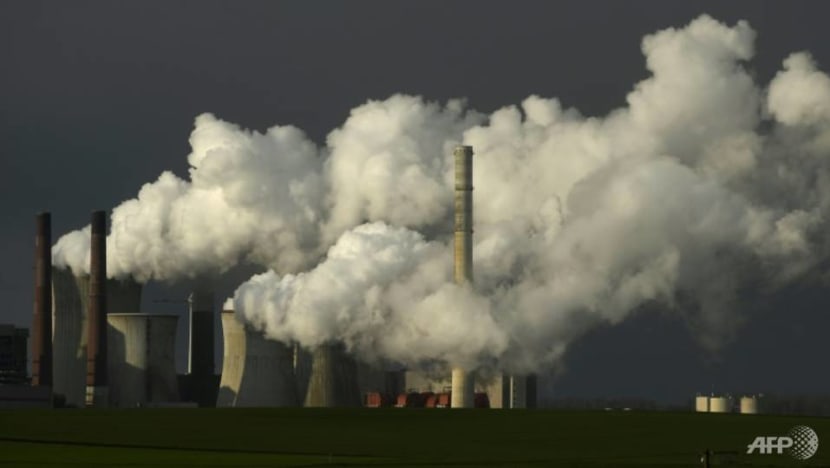G20 recognises carbon pricing as climate change tool for first time

More than 110 countries have committed to becoming carbon neutral by mid-century, including major greenhouse gas emitters such as Britain, Japan and South Korea. (Photo: AFP/Ina Fassbender)
VENICE: G20 finance leaders recognised carbon pricing as a potential tool to address climate change for the first time in an official communique on Saturday (Jul 10), taking a tentative step towards promoting the idea and coordinating carbon reduction policies.
The move marked a massive shift from the previous four years when former US President Donald Trump's administration routinely opposed the mention of climate change as a global risk in such international statements.
The communique, issued on Saturday after a meeting of Group of 20 finance ministers and central bank governors in the Italian city of Venice, which is threatened by rising sea levels, inserted a mention of carbon pricing among a "wide set of tools" on which countries should coordinate to lower greenhouse gas emissions.
Such tools include investing in sustainable infrastructure and new technologies to promote decarbonisation and clean energy, "including the rationalisation and phasing-out of inefficient fossil fuel subsidies that encourage wasteful consumption and, if appropriate, the use of carbon pricing mechanisms and incentives, while providing targeted support for the poorest and the most vulnerable", said the communique from the financial leaders of the world's 20 major economies.
READ: G20 endorses historic global tax reform
READ: COVID-19 variants threaten global recovery, G20 warns
The statement was issued just days before the European Union was scheduled to unveil a controversial carbon-adjustment border tax on goods from countries with high carbon emissions.
"It is the first time in a G20 communique you could have these two words 'carbon pricing' being introduced as a solution for the fight against climate change," French Finance Minister Bruno Le Maire told reporters. "We have been pushing very hard to have these two words ... introduced into a G20 communique."
REVERSAL OF TRUMP-ERA INITIATIVES
Those efforts met strong US resistance for most of Trump's presidency, during which the United States quickly withdrew from the Paris climate agreement.
At a summit in Saudi Arabia in 2020, then-US Treasury Secretary Steven Mnuchin agreed to a G20 reference to climate change, but not as a downside risk to global growth. Instead, it was included in a reference to the Financial Stability Board’s work examining the implications of climate change for financial stability.
The carbon pricing mention on Saturday marks the influence of the Biden administration, which immediately rejoined the Paris agreement in January and has set out ambitious carbon reduction targets and clean energy and transportation investment plans.
But while supporting emissions reductions, US Treasury Secretary Janet Yellen called on Friday for better international coordination on carbon-cutting policies to avoid trade frictions.
SINGAPORE'S CARBON TAX
Singapore Finance Minister Lawrence Wong on Monday said the world must come together to act urgently on climate change.
“The current average global emissions price of US$3/tonne is too low. One idea being mooted at the G20 is to have a global minimum floor price for carbon, and to set it at a higher level across the board.
"Naturally, countries will have their own considerations as to where the right price should be, and it will take some time to forge an international consensus on this,” he said in a Facebook post.
He added that Singapore already has a carbon tax, and that the Government is now reviewing the level and trajectory of the carbon tax, and will take these global developments into consideration in its review.
“We will continue to reduce our emissions and carbon footprint, and do our part to contribute to the overall efforts to decarbonise the global economy,” said Mr Wong, who attended the G20 meeting in Venice.
The EU's carbon border adjustment mechanism would impose levies on the carbon content of imported goods in an effort to discourage "carbon leakage", the transfer of production to countries with less onerous emission restrictions. Critics of the measure worry that it could become another trade barrier without reducing emissions.










